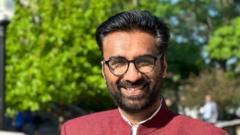Badar Khan Suri, a conflict studies expert originally from India, was taken into custody by US authorities on March 17, sparking controversy due to allegations linking him to terrorist organizations. Suri's journey into the complexities of the Israeli-Palestinian conflict began over 15 years ago when he joined a humanitarian convoy to Gaza, an endeavor supported by his academic interest in understanding global disputes.
On this significant trip, Suri met and later married Mapheze Saleh, the daughter of a former Hamas advisor. The couple initially moved to Delhi, where they lived for nearly a decade before relocating to the United States, where Suri secured a postdoctoral fellowship at Georgetown University.
However, on the evening of March 17, police arrested Suri at his Virginia home, citing allegations of his close associations with known Hamas figures. The accusation was publicly announced by Tricia McLaughlin from the Department of Homeland Security, which has enforced stricter immigration policies under President Trump's administration.
Despite entering the US legally on a student visa, Suri now faces potential deportation. However, a US court has temporarily blocked this action, raising concerns and shock among his family and acquaintances back in India. Many of Suri's peers described him as a dedicated and soft-spoken scholar, countering claims of any illegal associations with terrorism.
Historically, India has supported the Palestinian cause while also strengthening ties with Israel, creating a delicate balance that complicates the narrative surrounding Suri's situation. Critics of the allegations argue that having an academic perspective on such a conflict does not amount to criminal activities. A Jamia professor stated, “Having a view on the ongoing conflict is not a crime,” emphasizing Suri's commitment to humanitarian work rather than any militant connections.
Recollections from those who traveled with Suri highlight his commitment to humanitarian efforts during his two visits to Gaza. While his involvement with the Palestinian cause intensified, friends believe that his interest remained largely intellectual and humanitarian rather than political.
In 2023, Suri's wife, who is a US citizen and previously worked as a translator in Gaza, moved to the US to be with him. The couple's relationship has surfaced as a focal point in the legal proceedings, with Suri's father expressing sorrow over the circumstances, insisting that his son has no ties to Hamas outside of his marriage. He remains hopeful that justice will prevail as claims against his son remain unproven.
Overall, the arrest of Badar Khan Suri not only underscores the complexities of US immigration policies but also the challenges faced by scholars whose work intersects sensitive geopolitical issues. The unfolding situation intensifies discussions around freedom of expression and the scrutiny of international connections in academia.





















